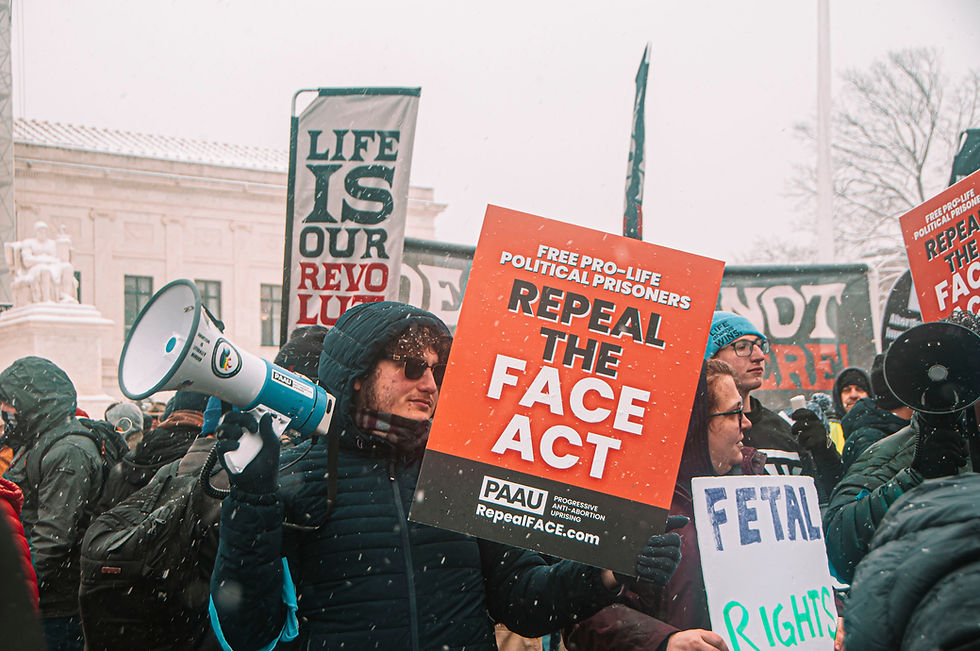“You’re Not Alone”: The Work of Florida’s JMJ Pregnancy Center
- mcoswalt
- Apr 26, 2022
- 4 min read
—
Florida recently adopted a new law on “Reducing Fetal and Infant Mortality” that, among other measures, bans many abortions after 15 weeks of pregnancy. Among those who spoke at the law’s signing ceremony on April 14th was Kelly Therrien, the mother of a three-year-old girl named Sophia.
In her remarks, Therrien described her decision to have her daughter:
No one wanted my daughter, her father said it’s not mine, my parents wanted nothing to do with the pregnancy, my mother even took me for the abortion, but when I got there, I didn’t do it… I had nothing, I had nobody, but I did it. My daughter will be 3 ½ on the 17th. I was pro-choice, but when you get in that spot, and it is you personally, it messes with your mind, and I am against it now, because I wouldn’t have her. People say she was a mistake, but no, she was a surprise.
Among those who helped Therrien in choosing life for her child were the staff and volunteers at JMJ Pregnancy Center. JMJ is the largest Catholic crisis pregnancy center in Florida, with a presence in Orlando and Kissimmee.
Founded by pro-life activists Ann Drolet and Frances Murray in 1990, JMJ has provided services and support to thousands of women. In 2021, the center saw 1,097 clients. Staff estimate that in the last three years JMJ's work has contributed to 2,314 children being alive today.
JMJ staff and volunteers work not only to help pregnant women have their children but to provide broad support to these mothers in their particular needs. As JMJ Director of Operations, Chloé Battle, told me, “We have to walk with these people, show them how to do it, and that they are NOT alone.”
A post-abortive mother, Battle commented, “In my personal experience, coming from being 19 years old and dealing with an abortion at Planned Parenthood myself, the single most complicated issue is who is going to be with you if your parents say no, if your boyfriend says no…who is going to be with you?”
When a woman calls or makes an appointment with JMJ, the first question asked is “What brought you in today?” Rather than put her through some formulaic process, the JMJ advisors ask her to tell her story and aim to understand what her relationship and economic situations are. At their locations, JMJ tries to create a peaceful environment, more like a living room than a doctor’s office, for these conversations. Baby models and videos of pre-natal development are on display.
JMJ offers pregnancy tests and also limited diagnostic ultrasounds to clients. The center has two sonographers on staff, as well as a nurse manager trained to do these life-saving ultrasounds. The capability to provide this service is very important. JMJ’s Executive Director, Bob Perron, told me that the vast majority (89%) of women who see ultrasounds of their child will carry their child to term. “The more people we have trained to do [ultrasounds], the more lives that we save,” Perron said.
Last year, JMJ provided 893 pregnancy tests and 678 ultrasounds. These are only part of the center’s services, though. JMJ provides necessary maternity and baby supplies, helps clients access vital services such as Medicaid and WIC, and also helps find shelter for clients who need it.
Their Father John McCormick Medical Clinic also provides abortion-minded and abortion-vulnerable women the opportunity to meet and receive services from local pro-life physicians in their center, free of charge, to follow through on their commitment to prenatal and postpartum care for these moms and babies.
Battle explained that JMJ advisors watch for signs of domestic abuse, human trafficking, substance abuse, and sex trafficking. JMJ partners with the human trafficking task force of Catholic Charities and provides women with a number to call to get to a safe place.
Through its Lifting Lives Program, JMJ also offers classes for clients in areas such as nutrition, nursing, and bonding with their babies and partners; budgeting and handling finances; and finding appropriate resources for their circumstances—if they need immigration assistance, for example. The center’s Gift-A-Lift Program provides transportation to and from JMJ for pregnant students at Orlando metro-area colleges.
Asked what is the greatest challenge they face, Battle answered: “Funding, funding, funding.” JMJ uses methods such an annual gala (to be held September 24th this year), baby bottle drives and baby showers at churches, and both financial and in-kind donations to pay staff and provide services.
Resources are also necessary to give JMJ an online presence that allows prospective clients to find them. Perron explains, “As good as sidewalk counseling is, it is becoming more and more difficult to do.” Abortion providers are getting adept at keeping counselors away from pregnant women. Virtual outreach is thus important, and “Google is not cheap,” he comments.
Battle predicts that the new 15-week law means that JMJ’s services will be more in demand. “More and more of those women facing unplanned pregnancies are going to be showing up on our doorstep.” She recalls a client who had substance abuse issues and was contemplating abortion in her third trimester. Counseling the woman over the phone, Battle persuaded her to come to Orlando to receive JMJ services.
The message JMJ tries to send, Battle says, is “You’re not alone.”



Comments